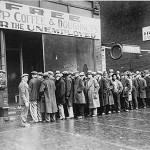New Proposed Loan Regs Slam the Poor
 With the nation in the midst of tough economic times, a new proposal in the Senate to restrict short term “payday” loans will only increase the difficulties low-income individuals face to obtain credit.
With the nation in the midst of tough economic times, a new proposal in the Senate to restrict short term “payday” loans will only increase the difficulties low-income individuals face to obtain credit.
Senator Kay Hagan of North Carolina currently has a plan to reduce payday lending. Her stated goal is to end it across the entire country, just as she ended it in her own state. However, the New York Federal Reserve looked into what has happened to states which have banned payday lending, and the results are decidedly negative for consumers and households. Do we really want to bring this to the entire nation?
Payday loans are small short-term loans intended to last until a person’s next paycheck. They have very high interest rates and are often used by low-income individuals. Some advocacy groups such as the Center for Responsible Lending believe that these loans pull individuals into a “debt trap”. They argue that the payday business is “built on making loans borrowers cannot afford to pay off, so that they will keep coming back and paying repeated fees on the same small amount of money borrowed.” Because of concerns like this, North Carolina and Georgia have banned payday lending.
These bans have not improved the lives of low-income individuals. The Federal Reserve Bank of New York compared the finances of households in Georgia and North Carolina with the rest of the country. They find that there was no improvement, and that personal finances were actually worse off, “Our findings will come as no surprise to observers who have noticed that payday credit, as expensive as it is, is still cheaper than a close substitute: bounced check ‘protection’ sold by credit unions and banks …the protection can be quite expensive.”
The report explained: “Georgians and North Carolinians do not seem better off since their states outlawed payday credit: they have bounced more checks, complained more about lenders and debt collectors, and have filed for Chapter 7 (“no asset”) bankruptcy at a higher rate.”
The empirical evidence does not seem to factor into Senator Hagan’s convictions. Hagan comments: “In the state Senate, I worked to pass legislation that effectively ended payday lending in North Carolina, and I hope to do the same across the country.” Currently, Senator Hagan’s Payday Lending Limitation Act has been referred to the Senate Banking Committee. It would restrict the number of payday loans that can be taken out by an individual to a maximum of six.
While reform is certainly needed to improve the opportunities for low-income individuals to have responsible access to credit, the real world experience with the consequences of Senator Hagan’s proposals should give all members of the banking committee pause.